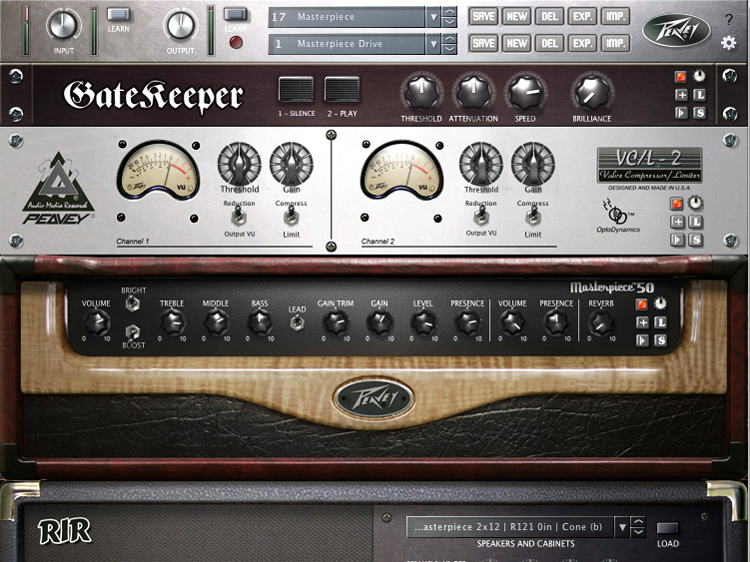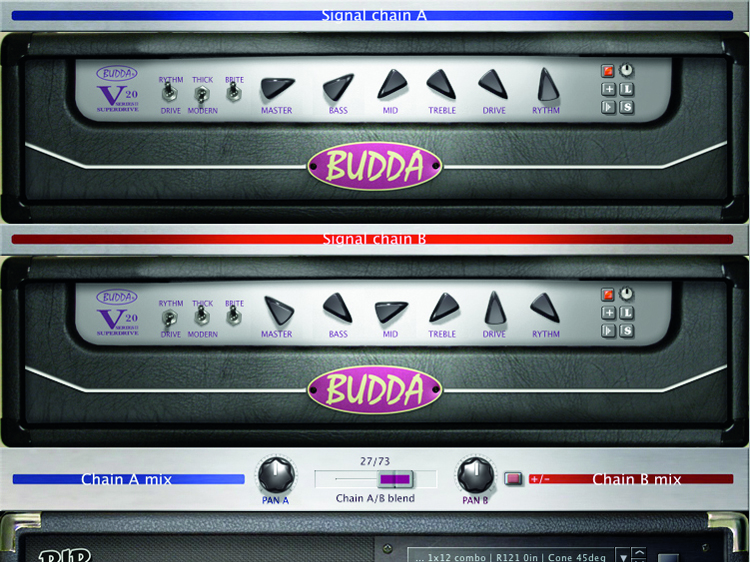MusicRadar Verdict
Quality tones in software with plenty of tweakability.
Pros
- +
Usable sounds. Simple user interface. Amps you won't find elsewhere.
Cons
- -
No phrase training in standalone version.
MusicRadar's got your back

Peavey Revalver Mk III.V

Peavey Revalver Mk III.V
It's been three years since Peavey brought out version III of the Revalver amp and effects software, and here comes its mid-point update, version III.V. Regardless of its name, III.V features many changes from before, so is definitely worth a fresh look.
What's remarkable about Revalver is that you can tinker with virtual amps at component level, changing virtual valves, transformers and the like.
"New in III.V is the Budda Budwah, the Gate Keeper, a valve-based noise gate, and a modelled version of Peavey's VCL-2 tube compressor."
Version III.V debuts several new amp and effects models and enhancement of the valve model algorithms to offer more realism. There's improved runtime performance on both the operating system and host level and more besides.
Revalver III.V uses a familiar virtual rack interface, into which you can drag and drop amp and effects modules. You can have two complete amp and effects rigs in the rack - one above the other - with a control module to select either, or you can blend the two.
Sounds
The software comes with a bunch of preset rigs to give you instant sounds. All are solidly usable and easy to put to work quickly either for recording or gigs. Everything can be adjusted easily and you're able to add and take away modules at will, starting with either one of the presets or an empty rack.
To go deeper, a simple click on any amp takes you to the Tweak Module GUI, where you can modify valve types, power amps, rectifiers, output transformers and tone stacks.
The range of amps will tick most players' boxes, with the Fender Bassman, Vox AC30, Mesa Rectifier, and Marshall Bluesbreaker and JCM900 represented. But it's perhaps
Peavey's own amps (and this includes Budda) - rarely found in rival programs - that provide the most interest. Among the new models are Peavey's 3120, Masterpiece and Sensation, plus Budda's Superdrive II and V - all of which offer some excellent tones.
The range of effects doesn't veer off into esoteric areas, but covers all the basic meat-and-potatoes stompbox and studio processing types. New in III.V is the Budda Budwah, the Gate Keeper, a valve-based noise gate, and a modelled version of Peavey's VCL-2 tube compressor, which can really enhance the sound of your rig.
For more flexibility, if you use VST plug-ins, there's the VST module, which you can insert into your rig for adding any other effects from your hard drive.
The notion of using stuff from outside Revalver is carried over into setting up your speaker simulation and ambience, as you can import impulse responses in WAV format, but there's already loads of variation available anyway.
Sound-wise, there's a lot of realistic detail and you get a satisfyingly dynamic playing experience. If you're a fan of Peavey amps, this is obviously the software for you, but there's plenty for everyone else too, especially with the deep editing facilities.
Revalver III.V is a step up from version III, and we think it's worth the upgrade price for current users who want to widen their palette.
Those new to amp sims are spoilt for choice. If that's you, then definitely consider Revalver - it's a source of no-nonsense, high-quality, playable sounds for recording.
Trevor Curwen has played guitar for several decades – he's also mimed it on the UK's Top of the Pops. Much of his working life, though, has been spent behind the mixing desk, during which time he has built up a solid collection of the guitars, amps and pedals needed to cover just about any studio session. He writes pedal reviews for Guitarist and has contributed to Total Guitar, MusicRadar and Future Music among others.
“If they were ever going to do the story of Nero, probably the most decadent of all the emperors, they would have to use Roy Thomas Baker”: A tribute to the legendary producer of Queen, Alice Cooper, Journey and more, who has died aged 78
“Built from the same sacred stash of NOS silicon transistors and germanium diodes, giving it the soul – and snarl – of the original”: An octave-fuzz cult classic returns as Jam Pedals resurrects the Octaurus
What’s the buzz? Meet Yellowjacket, Cherry Audio's recreation of EDP’s trend-setting Wasp from 1978










